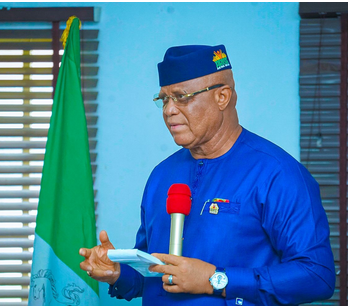The proposed 18-floor Ibom Towers project in Lagos is an ambitious initiative by Governor Umo Eno that has sparked considerable debate and criticism. Some critics have raised valid concerns regarding the project’s viability, especially given the current food crisis and hardship affecting the state.
While many critics appear to be misinformed due to a lack of understanding about economic planning, others oppose the project without fully researching its long-term benefits. I believe that the Ibom Towers initiative deserves a closer examination, as it could represent a forward-thinking investment strategy aligned with long-term economic goal.
Many critics of the Ibom Towers project argue that resources should be focused on addressing immediate issues such as food security and poverty alleviation. They view the construction of high-rise buildings as a misapplication of funds, especially in a time of economic crisis. Some critics have even taken their disapproval further, suggesting that those supporting the project lack a fundamental understanding of the state’s pressing needs. This sentiment reflects a common tension in governance: the balance between addressing immediate crises and planning for future growth.
While these concerns are valid and highlight the urgency of addressing current hardships, they also risk overlooking the potential benefits of long-term investments. Critics often seem to ignore the reality that economic resilience requires more than just immediate relief; it demands a vision for sustainable growth.
The Ibom Towers project to my mind is more than just a series of buildings; it symbolizes a strategic investment in the future. The global economy is evolving, and regions that fail to adapt risk being left behind. As oil prices fluctuate and concerns about sustainability grow, diversifying the economy becomes paramount. This is where projects like the Ibom Towers come into play because someday, oil will dry up or perhaps no more be an indispensable source of energy.
Investing in real estate and tourism, akin to the successful strategies implemented in cities like Dubai, can create a multifaceted economy that thrives beyond oil revenues. The development of the Ibom Towers could attract businesses, boost a robust revenue fountain for the State in future. In this context, critics who focus solely on present challenges may be neglecting the broader picture of economic diversification and stability.
In a world where natural resources are finite, and economies are subject to rapid change, the need for innovative solutions becomes more pressing. The critics who dismiss the Ibom Towers project as an extravagant expenditure may be operating under a short-sighted view. Investments in infrastructure, such as high-rise buildings, can stimulate economic activity, attract foreign investments, and attract constant flow of revenue.
Moreover, the Lagos area is a hub of economic activity, offering vast opportunities for development. The Ibom Towers project could capitalize on this momentum, providing a platform for various enterprises to flourish. By creating a business-friendly environment, the state can ensure that it remains competitive in a rapidly evolving global market.
Looking at successful models around the world reveals how strategic investments can reshape economies. Dubai, for instance, transformed from a modest trading port into a global metropolis through strategic investments in tourism, real estate, and infrastructure. The foresight of its leaders in recognizing the potential of diversifying their economy has positioned Dubai as a leader in the global market.
By taking inspiration from such models, Akwa Ibom State could also pivot towards a more sustainable economic framework. The Ibom Towers project may serve as a catalyst for similar developments, paving the way for an interconnected network of businesses and services that contribute to the state’s overall economic health.
Critics must recognize that while immediate needs such as food security are undeniably pressing, they do not preclude the possibility of investing in future growth. A multifaceted approach that addresses both current challenges and future opportunities is essential. The government can pursue agricultural initiatives alongside infrastructural projects, creating a balanced strategy that nurtures both immediate and long-term needs.
Ultimately, the discourse surrounding the Ibom Towers project highlights a critical juncture for Akwa Ibom State. While it is essential to acknowledge and address current hardships, it is equally important to foster a vision for the future that prioritizes sustainable growth and economic resilience. Dismissing the potential of such projects as misguided or extravagant risks stifling the creativity and innovation necessary for progress.
The Ibom Towers project represents not just a construction initiative, but a bold step towards a diversified and resilient economy. As critics voice their concerns, it is crucial to engage in constructive dialogue that balances immediate needs with long-term vision. Embracing investment in the future can help ensure that Akwa Ibom State thrives, not just for today, but for generations to come having in mind that someday, oil will cease to be a major source of revenue for the State.





